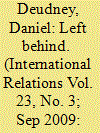| Srl | Item |
| 1 |
ID:
092035


|
|
|
|
|
| Publication |
2009.
|
| Summary/Abstract |
Anarchy and the balance of power are the two core ideas in Waltz's neorealism, and he explicitly draws them from early modern political theory, particularly Hobbes and Rousseau. Unfortunately, Waltz leaves behind a key variable in these early modern state-of-nature arguments: violence interdependence - the capacity of actors to harm one another (independent of distribution of power). This difference between the extreme insecurity of the state of nature and the tractable insecurity of the state of war derives from different degrees of violence interdependence. The variable is implicit but powerful in Hobbes, and explicit in Rousseau's analysis of topographic fragmentation as a foundation for the European state system. As the effects of the industrial revolution made themselves felt, many theorists (the global geopoliticans, Carr and many liberals) continued to employ the variable Waltz dropped, and they generally argued that Europe had shifted from a state-of-war to a state-of-nature anarchy, thus posing the choice of catastrophe or integration. Herz and Morgenthau continue this argument in the nuclear era, reaching very different conclusions than Waltz. Similarly, the balance of power was conceived by early modern republican theorists as the counter to hierarchy, and this was transposed to the 'system level' via the device of referring to Europe as a whole as a 'republic' that was in part 'by nature'. Other important republican power restraints (notably division, mixture and union) were dropped by Waltz but are developed by liberal globalist security theory.
|
|
|
|
|
|
|
|
|
|
|
|
|
|
|
|
| 2 |
ID:
187536


|
|
|
|
|
| Summary/Abstract |
The literature on International Relations theory has yet to align relational theory with role theory, despite the fact that these two theories share so much epistemological common ground. This article uses role theory to bridge the gap between the Confucian and Western conceptions of relationality, whose practitioners regard each other as strangers. With the support of role theory, the comparative analysis of relationality in this article has mainly focused on two different types of relations: prior rule-based relations and improvised relations. The differences in the cultural preparation for these two relations partially explain the plurality of the relational universe and the perception of stranger. Role theory is one way to reconnect the seemingly irreconcilable relational universes. To illustrate the value of a composite agenda of relational theory and role theory, the article will use Kim Jong-un of North Korea as its case. Confucian relations propose that, for all nations, the necessity of having a certain role relation is a more important agenda than insisting on exactly what role to take.
|
|
|
|
|
|
|
|
|
|
|
|
|
|
|
|